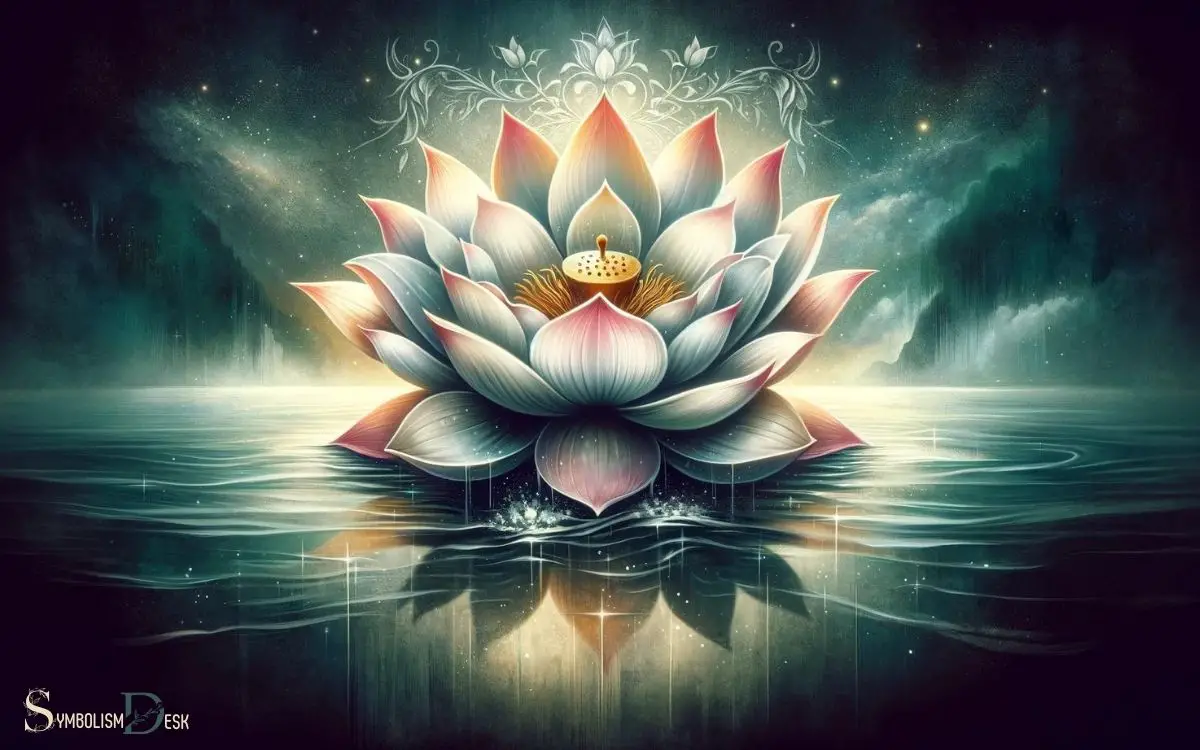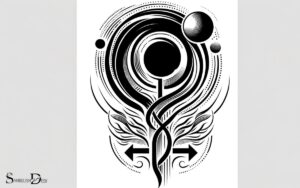What Does a Lotus Flower Tattoo Symbolize? Purity!
A lotus flower tattoo typically symbolizes purity, enlightenment, rebirth, and the overcoming of obstacles, as the lotus rises from murky waters to bloom beautifully.
The lotus flower holds profound symbolism across various cultures. In Buddhism, it represents spiritual awakening and purity of the body, speech, and mind, as the lotus blooms untainted by the mud.
In Hinduism, it is associated with beauty, prosperity, and fertility, with gods often depicted sitting on lotus thrones.
The Egyptian lotus flower symbolizes the sun, creation, and rebirth. The lotus can also represent:
Embrace the spiritual journey with a lotus tattoo, an emblem of purity and triumph over adversity.

Key Takeaway
Origins of the Lotus Symbol
The lotus symbol has origins that can be traced back to ancient civilizations in various parts of the world.
- In Egyptian culture, the lotus flower was associated with the sun and rebirth. The flower emerged from the murky waters, bloomed during the day, and closed at night, symbolizing the cycle of life and the afterlife.
- In Hinduism and Buddhism, the lotus holds a sacred place, representing purity, enlightenment, and divine birth. The idea that something beautiful can emerge from murky or muddy waters is a powerful metaphor for spiritual growth and transformation.
Across different cultures, the lotus symbolizes resilience, beauty, and the ability to rise above adversity. Its enduring significance reflects its timeless appeal as a symbol of hope and spiritual awakening.
Cultural and Religious Significance
Originating in ancient civilizations, the lotus flower holds cultural and religious significance, symbolizing purity, enlightenment, and rebirth.
In Hinduism and Buddhism, the lotus is a sacred symbol representing spiritual growth and the journey to enlightenment.
The flower’s ability to emerge from murky waters and bloom in pristine beauty mirrors the idea of rising above obstacles to achieve purity and enlightenment.
In ancient Egypt, the lotus was associated with the sun and rebirth, as it closes at night and reopens in the morning.
Similarly, in Chinese culture, the lotus represents purity and perfection. Its significance in various cultures and religions highlights its universal symbolism of overcoming challenges, spiritual transformation, and the journey to inner peace.
Therefore, a lotus flower tattoo can hold deep cultural and religious meaning for those who choose to adorn themselves with this symbol.
Lotus Flower Tattoo Designs
Lotus flower tattoo designs come in various styles and sizes, reflecting the cultural and religious significance discussed earlier.
Some popular designs include a single lotus, a bunch of lotus flowers, or a lotus with other elements like water, waves, or Buddha.
The size and placement of the tattoo can also vary, with some people opting for small, intricate lotus tattoos on their wrists or ankles, while others choose larger designs that cover their back or chest.
The style of the lotus can range from realistic to minimalist, with some tattoos incorporating vibrant colors and intricate details, while others are more simple and symbolic. Each design choice holds its own meaning and resonates with the individual getting the tattoo.
Symbolism of Different Lotus Colors
Various lotus colors symbolize different meanings, adding depth and personal significance to lotus flower tattoos.
The choice of lotus color can convey specific ideas and emotions, making it an important factor in tattoo design.
Here are the symbolisms of different lotus colors:
- Pink Lotus: Represents the highest form of spirituality and is associated with the history of Buddha and the symbolism of purity.
- Light Pink: Signifies tenderness, healing, and love.
- Dark Pink: Symbolizes grace and elegance.
- White Lotus: Symbolizes purity of the mind and spirit.
- Pure White: Represents spiritual perfection and the pacification of one’s nature.
- Blue Lotus: Signifies wisdom, knowledge, and the victory of the spirit over the senses.
Understanding the meanings behind different lotus colors can help individuals choose a tattoo that resonates with their personal beliefs and aspirations.
Lotus Tattoo Placement and Meaning
Lotus tattoos hold various meanings and are often placed on different parts of the body, each carrying its own significance.
The symbolism of lotus tattoos, the popular placement options, and the cultural significance and interpretation of these designs will be explored in this section.
Understanding the meanings behind the placement of lotus tattoos can provide insight into the individual’s personal connection to this symbol.
Symbolism of Lotus Tattoos
The symbolism of lotus tattoos extends beyond mere aesthetics, with their placement and meaning reflecting deeply personal and spiritual significance for individuals.
When considering the symbolism of lotus tattoos, it’s important to understand the potential meanings associated with their placement on the body.
- Placement: The placement of a lotus tattoo can convey different meanings, with tattoos on the wrist symbolizing purity and enlightenment, while those on the back may represent strength and resilience.
- Wrist placement: Symbolizes purity and enlightenment.
- Back placement: Represents strength and resilience.
- Meaning: The lotus flower holds various meanings in different cultures, such as purity, rebirth, and spiritual awakening, and the color of the lotus can also impact its symbolism.
- Purity and rebirth.
- Spiritual awakening.
Popular Placement Options
Popular among tattoo enthusiasts, the lotus flower can be placed on the body in various locations, each carrying its own symbolic significance.
The placement of a lotus tattoo can further enhance its meaning and personal relevance to the individual.
Here are some popular placement options for lotus flower tattoos:
| Placement | Meaning |
|---|---|
| Wrist | Represents purity, enlightenment, and spirituality. |
| Back | Symbolizes rebirth, growth, and new beginnings. |
| Ribcage | Signifies strength, beauty, and resilience. |
| Ankle | Represents personal growth, progress, and strength in adversity. |
Choosing the placement of a lotus tattoo is a personal decision, and understanding the symbolic significance of each placement can help individuals make a meaningful choice.
Cultural Significance and Interpretation
Cultural understanding of lotus tattoo placement and its associated meanings enriches the personal significance of this ancient symbol.
In various cultures, the placement of a lotus tattoo carries specific meanings:
- Wrist: Represents purity and spirituality, as the wrist is believed to be a gateway for energy flow.
- Back: Symbolizes rebirth, growth, and spiritual development, as the back is associated with strength and support.
- Ankle: Signifies determination and the journey towards enlightenment, reflecting the lotus’s growth from the mud through murky waters to blossom in the sunlight.
Understanding the cultural significance behind lotus tattoo placement adds depth to its symbolism, allowing individuals to connect with the values and beliefs associated with this revered flower.
Modern Interpretations of Lotus Tattoos
In recent years, lotus flower tattoos have taken on new cultural and personal meanings, reflecting the evolving representations of this ancient symbol.
From representing rebirth and purity to embodying strength and resilience in modern contexts, lotus tattoos continue to hold deep significance for individuals across different cultures.
Understanding these contemporary interpretations sheds light on the enduring relevance and adaptability of lotus tattoos in today’s society.
Evolving Cultural Representations
Exploring contemporary interpretations of lotus flower tattoos reveals a dynamic evolution of cultural symbolism and personal significance.
In today’s diverse society, lotus tattoos continue to hold deep meaning for individuals of various backgrounds.
- Fusion of Traditions: Many people blend traditional Eastern symbolism with Western tattoo artistry, creating unique designs that reflect their multicultural identity.
- Resilience and Strength: The lotus is often chosen as a symbol of resilience, representing the ability to rise above adversity and bloom despite challenges.
- Self-Discovery and Enlightenment: In modern interpretations, lotus tattoos are embraced as a representation of personal growth, self-discovery, and the journey towards enlightenment.
This contemporary perspective reflects the ever-changing nature of cultural symbolism and the enduring relevance of the lotus flower.
Contemporary Meanings and Significance
The contemporary significance of lotus tattoos has evolved to encompass themes of personal growth, resilience, and multicultural identity.
In today’s society, the lotus flower is often associated with personal development and overcoming challenges. Many individuals choose to ink lotus tattoos as a symbol of their own journey towards inner strength and enlightenment.
The unfolding petals of the lotus can represent the unfolding of one’s true self and the ability to rise above adversity.
Moreover, in a world that’s increasingly interconnected, the lotus flower also serves as a symbol of multiculturalism and global unity.
People of diverse backgrounds embrace the lotus as a representation of their shared humanity and the beauty of cultural diversity.
These modern interpretations reflect the timeless appeal and adaptability of the lotus as a profound and meaningful tattoo choice.
Conclusion
The lotus flower tattoo holds rich symbolism and meaning, with its origins rooted in various cultures and religions. Its representation of purity, enlightenment, and resilience makes it a popular choice for tattoo designs.
Whether it’s a vibrant pink lotus symbolizing love and compassion or a serene blue lotus representing wisdom.
The lotus tattoo continues to hold deep personal significance for those who choose to adorn their bodies with its beauty, much like the flower itself rising from the muddy waters to blossom into something beautiful.







